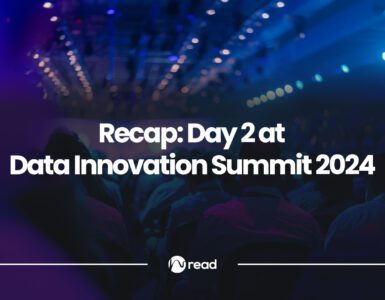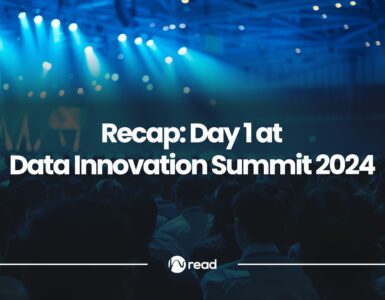In March 2021, we talked about a great milestone for Sweden and AI — when Linköping University announced the launch of Berzelius – Sweden’s fastest supercomputer for AI and machine learning workloads. The supercomputer, designed to fuel academic and industry research in the country, puts Sweden on the global map and in the competitive race towards AI-Driven business and society. However, the Berzelius launch was not an isolated success. It’s a piece in a broader picture – The AI Agenda for Sweden.
What does the AI Agenda for Sweden present?
The AI Agenda is a national action plan with the goal to coordinate and sharpen Swedish resources to make applied AI a factor in the journey towards a sustainable society.
The AI Agenda for Sweden was launched earlier this year, including 25 proposals to accelerate the positive effects of AI use in Swedish society in the short and long term, while minimising the risks. It embodies Sweden’s strides toward realising its ambition to be a leader in taking full advantage of the opportunities of digitalisation and AI in a responsible, inclusive, and sustainable way.
The purpose of the agenda is to accelerate the use of AI through strategic initiatives, coordination and consensus in the areas of research, education, business, the public sector, the general public, and infrastructure. The AI Agenda’s proposal aims to accelerate the positive effects of AI use in Swedish society.
The work with the AI Agenda for Sweden is led by RISE (Research Institutes of Sweden) in collaboration with actors from academia, business, the public sector and civil society, WASP AI, WASP-HS, AI Competence for Sweden, AI Sweden, Swedish AI Society, and the research on AI in the public sector performed by DIGG (Agency for Digital Government).


The AI Agenda launch started the journey towards accelerated use of AI by opening the way for public discourse to educate, alleviate concerns, and arouse curiosity in what AI can do in various sectors, explained Jeanette Nilsson, AI Ecosystem Driver at RISE.
For Sweden to take the lead in AI and continue advancing in the vanguard of specific areas, it requires collaboration and access to technology both inside and outside Sweden and from both the private sector and academia, she adds. Additionally, a strong industrial base and infrastructure are crucial to attracting those who want to work with AI.
Birgitta Bergvall-Kåreborn, Vice-Chancellor of the Luleå University of Technology, as one of the members involved in creating the work of the agenda, hopes the AI Agenda can contribute to increased understanding and awareness of AI. “It is important that we jointly gather strength in Sweden to take advantage of the positive effects of AI in society, both short and long term, and in a responsible, inclusive and sustainable way,” says Birgitta Bergvall-Kåreborn.
Marcus Liwicki, professor of Machine Learning at the Luleå University of Technology, who also participated in creating the agenda, believes that the joined forces prove that the issue is a priority. “To get an AI Agenda for the whole country, created and shaped by dozens of actors, shows how important and unique this work is. AI must benefit everyone and it requires coordinated and politically supported efforts,” says Marcus Liwicki.
AI as the core of digitalisation and the solution for societal challenges
In today’s day and age, where we relish the fastest flow of information, the highest computational power, large amounts of data and advanced algorithms, AI sits at the very core of advanced digitisation and its smart applications products, services and automation, the report describes. Thanks to the advancements in AI and new applications, it has become critical to solving the societal challenges of digitalisation, urbanisation, globalisation, climate change and ever-increasing welfare needs.
AI is perfectly positioned to help redistribute time and resources in society so that people can help each other and create new ways of providing decision support and simplifying everyday life for employees, customers and citizens.


Steps and actions to accelerate AI use in Sweden
The Agenda puts forward several proposals based on five different areas to accelerate the use of AI in Sweden.
Overall national initiatives
- Invest long-term in basic AI research in Sweden to ensure long-term competence, attract talent and international investments.
- Create and intensify collaboration by announcing national gatherings around AI in societal areas: Climate, democracy, and health care.
- Create a Swedish Center of Excellence in AI so that expertise and experiences can be shared and AI can be implemented effectively.
- Create a “Use case factory” – a place where good examples of AI applications in various industries are constantly updated and created.
- Create a useful target image, metrics and plan for the effects of using AI in companies and the public sector in Sweden.
- Continue to conduct active strategic work in inclusive and cross-sectional AI and engage even more Swedish actors to work together and fulfil an AI agenda for Sweden.
The public, civil society and man in a digital age
- Increase the understanding and awareness of AI and implications, opportunities, risks and limitations for individuals and society.
- Increase digital understanding and inclusion to enable residents of Sweden to take part in digital services and service through public education initiatives.
- Encourage NGOs, trade unions and civil society to discuss how AI-driven automation affects society, working life and the adjustment required for the individual and professional collectives.
Business and the public sector
- Develop a digital AI guide, which contains guidelines and practices that support the purposeful and sustainable development and use of AI solutions in public administration and business.
- Appoint AI advisors and change leaders for the public sector, unions and various industries.
- Enable “upskill and reskill” to cope with the adjustment of working life. Create innovation platforms for collaboration between AI companies and the public sector. Make it easier for AI companies to work together with the public sector in the public sector through innovation platforms.
- Create a Swedish digital AI infrastructure with common standards, where data and services can be shared to ensure privacy and data protection. This includes:
- A data portal common to authorities. For example, developing dataportal.se can create a new opportunity to share data between authorities.
- Assign the public sector to structure and make data available to be accessible for further use and innovation in collaboration with business and others.
- Invest in and facilitate lifelong learning in AI.
Education and research
- Secure AI knowledge for future generations. Ensure that students are given sufficient knowledge and understanding of AI and its consequences to be active and critical citizens.
- Enable AI-competent teachers at universities. Build critical mass at universities of AI-competent teachers with their own experience from research, teaching, and AI application. To ensure access to AI skills, only researchers and doctoral students in AI are not enough, but skilled teachers with practical experience in applying AI are also necessary.
- Develop a National Curriculum for AI. A common curriculum for AI would facilitate all training within AI.
- Develop vocational and role-specific training in AI, and increase incentives to create more corporate and application-oriented AI training for young and old business.
- Invest in interdisciplinary and multidisciplinary research with AI in focus to drive both disciplinary and AI research forward. This framework should include:
- Universities create interdisciplinary educational and graduate school programmes.
- Research funders prioritise interdisciplinary announcements.
- AI is defined as a separate research area with research funders.
- Sustainable funding and interconnection of data and AI labs – research in collaboration with society’s actors needs platforms for integration of data, models and AI methods, as well as activities that integrate research and application.
- Create conditions and incentives for shared services between companies and academia to strengthen knowledge transfer and ensure access to competence.
Infrastructure and enabling regulations
- Ensure that laws are adapted to a new reality where AI is a natural part of society. The EU needs to map and adjust existing regulations while maintaining data protection and ensure that there are legal conditions for experimental activities within AI and that AI can be implemented effectively in society.
- Closer cooperation and dialogue between business, public activities, and the Government Offices to receive and share information on equal terms in, for example, EU contexts. This also includes activities such as:
- Developing guidelines and best practices to apply AI in a legally secure way.
- Developing simple and clear examples of how personal data can be handled in a legally secure manner.
- Clarifying legal responsibility in an increasingly automated decision-making process.
- Build infrastructure for industrial research within AI and applied AI.
- Develop national testbeds, anonymised data sets and environments where authorities, companies and other organisations can practice and quality assure their AI use.
- Establish a large-scale cellular test system for IoT and applied AI. Being at the forefront of IoT and 5G infrastructures where many AI applications will be available and collect data, Sweden can establish a test system where research, industry and the public can develop and test ideas, applications and methods.


General conclusions and takeaways
With significant advances in AI in recent decades, the road from ideas and research to commercial applications can be short, the report concludes. But at the same time, there is a great need for more research and development to realise all the current applications, great demands on application and adjustment in industry and the public sector, and a considerable need for more expertise in the field.
From small start-ups to large industries, Swedish companies and large parts of the public sector see AI technologies as an essential component in the upcoming products and services. Although the level of maturity varies a lot, from existing strategic agendas and AI technology used on a large scale to completely open questions about what AI can mean for the organisation, there is a strong feeling of urgency to accelerate AI.


Sweden is in a great position as a technologically advanced country with a high degree of digital maturity and great potential for collaboration and innovation community organisation. To take advantage of the position and opportunities that AI offers, it must seriously strengthen the skills, research, development and application of AI in Sweden, the paper outlines. This, in turn, requires both AI expertise and deep domain knowledge to apply AI in practice. Having a critical mass of AI experts with deep technical knowledge and a broader group understanding AI technology while being experts in their own field is critical.
In this regard, it’s worth mentioning that accelerating the use of AI and leading in the AI race is a matter of working towards tackling the AI talent race.
So apart from the concrete proposals, the AI Agenda for Sweden also puts forward several general recommendations for sustainable AI development in Sweden:
- Ensure that Sweden is self-sufficient in AI competence – technical, organisational, scientific and interdisciplinary AI expertise
- Ensure high quality and interdisciplinary research, development and innovation – as an interdisciplinary field, AI continues to draw ideas from and apply in medicine, law, economics, production and social sciences. And to be able to use it requires extensive basic and applied research in AI.
- Ensure a strong ecosystem – the Agenda suggests that Sweden must achieve critical mass and build a strong ecosystem of companies, the public sector, universities and institutes who undertake to develop, adapt and use AI technology and the changes in organisations and society they bring about.
- Create game rules that favour the application of AI – Rules, laws and regulations should be continuously updated and designed to maximise support and simplify the introduction of AI technologies for companies and government agencies to dare to take the step into AI-driven business. They should also be designed from an ethical perspective with the human being at the centre.
Connecting to all previously said, the AI Agenda for Sweden advocates for a joint national initiative where resources are designed in collaboration, preferably in collaboration with EU initiatives, which is far more advantageous than each actor working separately. This way, we can avoid silos and instead share experiences and help each other. The Agenda also specifies that it’s easier to get started with the large-scale use of AI in business and government if resources are coordinated nationally.
The AI Agenda for Sweden indeed leads Sweden to the forefront of AI and strengthens the country’s competitiveness and competence. To take full advantage of the opportunities that AI offers, academia, business, the public sector and civil society must work hand-in-hand in realising the proposals.
Here you can download a copy of the AI Agenda for Sweden.















Add comment